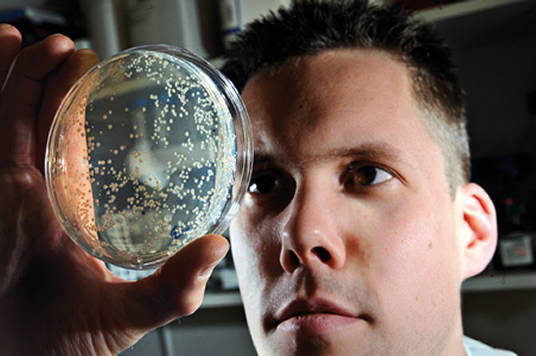In a paper published this week in Nature Communications, Dr Brian Jones, Principal Research Fellow in the university's School of Pharmacy and Biomolecular Sciences, details a new strategy to identify and analyse bacterial viruses. This permits the identification and characterisation of viral DNA captured in complex sequence datasets from gut bacteria (called metagenomes), and should provide a greater understanding of their function in the gut ecosystem.
Bacterial viruses (known as bacteriophage or phage) are the most numerous infectious entities on the planet. These microbial predators have a significant impact on bacterial communities in the environment and within the human body, where they may play a role in disease processes by disrupting the natural balance of the bacterial ecosystems we all harbour. The human gut in particular is home to a dense population of bacteria that play an intimate role in human development and well-being. These bacteria also support a myriad of bacteriophage, which may also influence how gut bacteria affect our health.
Presently, one of the most powerful approaches to studying microbial communities, including in the gut, is the large-scale sequencing of DNA extracted from these bacteria (a process known as metagenomics). However, this approach has only recently been adapted to the study of bacteriophage and a community-level analysis of these viruses remains challenging.

Dr Brian Jones
He said the research was bringing to light a population of potentially gut-specific bacteriophage, which could have direct relevance to human health in a number of ways. These range from the spread of antibiotic resistant genes, to effects on beneficial microbes and the structure of the gut ecosystem, although much more work needs to be done to confirm this. He said the study of bacteriophage continues to underpin new insights into microbial physiology and evolution and the continued development of tools for the community-level analysis of phage promises to underpin major advances in our understanding of important bacterial ecosystems.
Dr Jones, who is working with colleagues from across the Faculty of Science and Engineering, said: "In the longer term, by understanding how these viruses work we hope to learn more about their effect on the gut microbial ecosystem, and in doing so, look for new insight into the cause of gut conditions and opportunities for intervention. But first we need to gain a basic understanding of what's there, and develop tools to help us survey the bacteriophage community."
*The paper entitled "Genome signature-based dissection of human gut metagenomes to extract subliminal viral sequences" is published in Nature Communications, an online-only journal.